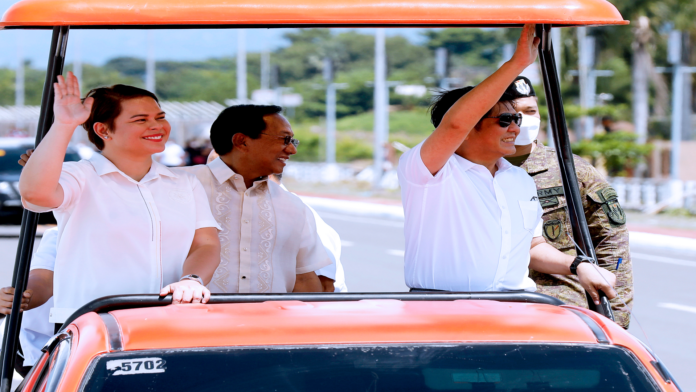Bumaba ang approval at trust ratings ni Pangulong Bongbong Marcos at Vice President Sara Duterte, ayon sa pinakahuling PAHAYAG 2023 Third Quarter Survey na isinagawa ng PUBLiCUS Asia Inc..
“The discontent with the top two officials is widespread, as evidenced by significant declines across various demographic segments and all regions except Mindanao,” pahayag nito.
Mula sa 62%, bumaba ang approval rating ni Marcos sa 55% . Bumaba rin ito sa iba’t ibang rehiyon, kabilang ang Metro Manila, North Central Luzon, South Luzon, at Visayas. Sumadsad rin ang kanyang trust rating sa 47% mula sa 54%.
“While more than half of respondents still agree with President Bongbong Marcos’s self-appointment as DA (Department of Agriculture) Secretary, this agreement has decreased compared to the previous quarter (from 57% to 53%),” dagdag pa ng PUBLiCUS Asia.
“As DA Secretary, addressing the reported shortages in rice, sugar, and other agricultural products is crucial, as these issues are likely contributing to the pressing problem of inflation.”
Nakaranas din si Duterte ng pagbaba sa approval rating mula 67% sa ikalawang quarter hanggang 62% sa ikatlong quarter, at ang kanyang trust rating ay bumaba rin mula 61% hanggang 55% sa parehong panahon.
“Agreement with Vice President Sara Duterte’s appointment as DepEd (Department of Education) Secretary has also significantly weakened compared to Q2 ’23 (from 66% to 60%). The controversy surrounding the Confidential and Intelligence Fund (CIF) for DepEd has emerged as the most pressing issue affecting her overall performance in this role,” paliwanag ng PUBLiCUS Asia.
Ang PAHAYAG 2023 Third Quarter Survey ay isang independent at non-commissioned survey. Gumamit ang survey ng purposive sampling, na binubuo ng 1,500 voter-respondent na random na kinuha mula sa isang market research panel ng mahigit 200,000 Filipino na maintained ng Singapore office of PureSpectrum, isang US-based panel marketplace na may multinational presence. Ang sample ay limitado sa mga rehistradong Pilipinong botante.
Ang sample respondents ay may edad na 18-49 taong gulang at nagtatrabaho, Romano Katoliko, mga nagtapos sa kolehiyo, at may monthly household income na 10,000 hanggang 115,000. Halos lahat ng nasa sample ay gumagamit ng kanilang sariling mobile phone at may internet access sa bahay, habang humigit-kumulang 90% ang bumoto sa nakalipas na tatlong halalan.


